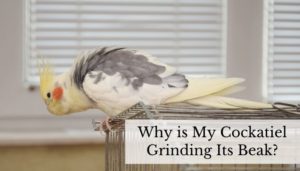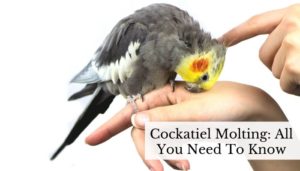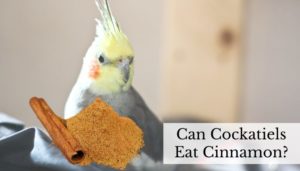So you’ve just gotten yourself a pet cockatiel, great job! One of the world’s most popular pet birds, this small member of the cockatoo family is a vividly expressive creature that is just as intelligent as they are social.
But if you’re a beginner, finding what can fit into your pet’s diet can be tricky. Similar to your diet, a cockatiel thrives when fed with a variety of nutritious foods. Unfortunately, much like children, cockatiels don’t always know what’s best for them.
Luckily, this doesn’t have to happen to you or your pet bird. To help make bird care easier, we’ve compiled an essential list of what cockatiels can eat. Furthermore, this article also includes foods that your cockatiel should avoid and other relevant information.
Variety is Key
Nutrition is one of the most neglected aspects of bird care, but this shouldn’t be the case. Here’s a list of essential and nutritious foods you should rotate for your cockatiel:
What Fruits Can Cockatiels Eat?
This should be easy, as cockatiels enjoy eating almost all types of fruits. Just make sure not to include fruit seeds, as most of them are toxic. Good fruits to feed include:
- Apples – these are a popular choice for pet birds in general, as they are rich in antioxidants and beneficial fiber. Give small pieces to your cockatiel every week.
- Bananas – Not only are bananas rich in nutrients, but they’re also soft and easy to eat. Feed these in moderation.
- Grapes – Both seeded and seedless are safe for your cockatiel as long as they are in moderation. They are also rich in vitamins and minerals.
- Strawberries – Cockatiels snack on these in the wild, so they’re safe (and nutritious!) to eat.
- Peaches – Peaches make for a sweet and nutrient-rich cockatiel treat, especially when mixed with other fruits.
- Apricots – As long as they are served in small portions, apricots are another great addition to your cockatiel’s diet and provide essential nutrients and dietary fiber.
- Papayas – In the wild, cockatiels love snacking on antioxidant-rich fruits like papaya, so they are sure to appreciate the occasional chunk right in your home.
- Mangos – Mangos are another year-round fruit staple that your pet bird is sure to love.
- Oranges – In addition to being citrusy and tasty, oranges also pack a lot of vitamin C, which your pet bird will benefit from.
- Cherries – When feeding cherries to your cockatiel, note that it tends to turn their droppings red, but they have no actual negative effect.
What Vegetables Can Cockatiels Eat?
Vegetables are very good for cockatiels and should be fed more than fruits. Of course, make sure to wash all vegetables before feeding them to your pet. Cockatiel-safe veggies include:
- Carrots – Carrots are rich in nutrients and minerals, and they are safe to eat both raw and cooked. Carrot tops are a cockatiel favorite!
- Broccoli – Broccoli comes packed with water, carbs, and protein, making them a great addition to any bird diet. The vitamin A in broccoli also helps keep your bird’s vision sharp.
- Beet Greens – Like any dark green and leafy vegetable, beet greens are a great source of calcium, which help keep your cockatiel’s eggshells dense and robust.
- Corn – Corns are highly nutritious and are one of the healthiest grains you can easily find on the market today.
- Kale – Like any leafy green vegetable, kale makes an excellent addition to any pet bird’s diet.
- Spinach Sprouts – These are rich in vitamin A, E, and K, but make sure to limit this food to only once a week.
- Turnip Greens – Turnip greens are another excellent vegetable addition to your cockatiel’s diet. They’re also rich in vitamin K and magnesium for bone health.
- Sweet Potatoes – These are packed with nutrients that can help your bird’s vision. However, keep in mind that cockatiels prefer eating cooked sweet potatoes.
- Pumpkins – Pumpkin seeds and pumpkin flesh contain healthy fats and protein that can benefit your cockatiel’s health.
- Bok Choy – This is another green vegetable that offers plenty of nutrients in your pet’s diet.
- Watercress – Watercress is a good source of calcium for cockatiels, which is essential for the health of their feathers and bones.
- Leaf Lettuce – As long as you don’t give too much, leaf lettuce is cockatiel-safe and should help hydrate your bird.
What Seeds Can Cockatiels Eat?
As long as you have variety and supplement it with other nutritious feeds, your cockatiel will enjoy eating seeds. Just make sure to clean their seed tray all the time to avoid fungus and bacteria. Your pet bird will love seeds like:
- Safflower – These offer both proteins for nutrition and carbohydrates for energy. They’re also a cockatiel favorite.
- Sunflower – Think of these more as a treat, as sunflower seeds are naturally high in fat that should be fed to your bird in extreme moderation. At best, they’re an excellent incentive for cockatiels that are being trained.
- Canary – These offer carbohydrates and are best served in a seed mix with more nutritious seeds for your bird.
- Millet – In particular, foxtail millet makes for a healthy seed addition. They’re also high in carbohydrates for energy.
- Pumpkin seed – As mentioned above, cockatiels love pumpkin seeds, and they are also high in nutrition.
- Oats – These make for a great occasional bird treat to introduce more variety to their diet.
- Hemp seed – Hemp seeds offer a complete amino profile and contain omega-3 beneficial to your cockatiel’s heart.
Pellets
In many cases, pellets are the ideal diet for cockatiels, and it’s good to start them on this diet while still young.
While pellets are not a natural part of a cockatiel’s diet, it’s easier to give your bird a balanced diet based on these. They also come in different forms for different life stages, like the usual pellets, nuggets, crumbles, and more.
If you’re transitioning to a pellet-based diet, it’s essential to be patient. Experiment with different pellets, as some cockatiels may have strong preferences for other shapes or sizes. We recommend picking a pellet with few to no artificial flavors.
What Can Cockatiels Not Eat?
While a cockatiel’s diet can be very varied, there are certain types of food that you should never feed your pet because of potential toxicity. This includes:
- Avocado – This is the number one no-no, as avocado leaves contain a substance that can damage your pet’s heart or even cause sudden death.
- Caffeine – Even a sip or two of caffeine can be toxic for our bird, so avoid any caffeinated drink and stick to clean water instead.
- Chocolate – Even in tiny amounts, chocolate can still be toxic to birds.
- Salt – Salt is also not recommended for any pet bird, especially cockatiels.
- Fruit Pits and Seeds – Most of these are potentially toxic, so it’s best to stay away from them.
- Onion and Garlic – These spicy veggies contain chemicals that can rupture your bird’s heart, cause an ulcer or even cause anemia.
- Xylitol – This artificial sweetener is not recommended to birds, as it’s unclear how their fast metabolism will react to this chemical.
- Rhubarb – All rhubarb parts are highly toxic to cockatiels.
- Milk – While it’s not technically toxic, birds cannot digest lactose found in dairy products like milk.
- Raw Potatoes – Never feed raw potatoes to your cockatiel. However, they are safe when cleaned, cooked, and provided in small amounts.
Aside from this, there are plenty of other things you shouldn’t feed your cockatiel, so always make sure to first check with a veterinarian if you want to provide them with something new.
Related Questions
What human food can cockatiels eat? Many human foods are good for pet birds when prepared correctly. You can give them a small amount of lean cooked meat, fish, or eggs. You can also provide them with peanut butter, bread, or yogurt. Just stick to a small amount, and your cockatiel is sure to appreciate it!
What veggies can cockatiels eat? Veggies are very good for cockatiels. As mentioned above, you can include carrots, broccoli, beet greens, dried tomatoes, corn, endive, kale, spinach, chards, and many more. Just make sure they’re clean, and avoid overfeeding them to your pet.
What snacks can cockatiels eat? There are plenty of snacks that your cockatiel can enjoy, both organic and non-organic. You can go for pieces of fruit, honey sticks, or millet sprays. You can even give them small unsalted popcorn and pasta. Just make sure to limit these types of food to at least once a month.
Conclusion
When it comes to your cockatiel, what you’re essentially looking for is a well-balanced nutritional plan. As long as you follow your avian vet’s advice and your research, then you should be able to find a consistent and healthy diet that will keep your pet happy and chirpy!





thank you for the usefull info.